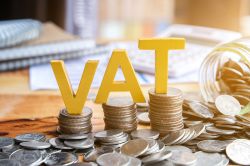 Register for VAT by December 4, 2017
Register for VAT by December 4, 2017 VAT implementation is all set to create over 5000 jobs in GCC
VAT implementation is all set to create over 5000 jobs in GCC The Federal Tax Authority (FTA) to Join e-Dirham System
The Federal Tax Authority (FTA) to Join e-Dirham System  Saudi, UAE to Enhance Collaboration for Boosting Their Economies
Saudi, UAE to Enhance Collaboration for Boosting Their Economies VAT Rules not yet finalized: UAE Ministry of Finance
VAT Rules not yet finalized: UAE Ministry of Finance No VAT on Sale and Purchase of Shares in UAE
No VAT on Sale and Purchase of Shares in UAE VAT Implementation may Bring Some Changes in Tourism and Hospitality Sector
VAT Implementation may Bring Some Changes in Tourism and Hospitality Sector 15th, November Last Date to File Excise Returns and Pay Dues in UAE
15th, November Last Date to File Excise Returns and Pay Dues in UAE  Fuel Prices to Rise Due to VAT Implementation in UAE
Fuel Prices to Rise Due to VAT Implementation in UAE Senior banker urged to postponed the implementation of VAT in UAE
Senior banker urged to postponed the implementation of VAT in UAE VAT Regulations in UAE Receives a Green Signal from Sheikh Mohammed
VAT Regulations in UAE Receives a Green Signal from Sheikh Mohammed VAT launch on 1st January 2018 asserted by Tax chief
VAT launch on 1st January 2018 asserted by Tax chief  No VAT will be levied on amount withdrawn from other bank’s ATM
No VAT will be levied on amount withdrawn from other bank’s ATM
What is the importance of fixed asset depreciation? The depreciation of fixed assets is primarily used to allocate cost over their functional and applicable lifetime retaining their usefulness. Companies compute fixed assets depreciation for taxation and accounting purposes and also to estimate their repair and replacement costs. In this post, we will highlight methods and ways to calculate it.

GCC regions are going to introduce Value added tax (VAT) effective from 1st January 2018, it will affect the entire system as it will have a broader impact on the businesses, SMEs have to prepare themselves in advance as they have to be more proactive in preparing themselves for VAT preparation.

The introductions of VAT will help the UAE generate extra revenues to finance open consumption and to reduce its reliance on hydrocarbons, in accordance with the national expansion system but the question is who is going to bear the burden, let’s find out.

The task of controlling, supervising and overseeing the ordering, storage and use of involved components that an organization or company makes use of in the production of the items or components markets and sells to customers is known as Inventory Management.

The Gulf Cooperation Council has already given the green signal to the imposition of Value Added Tax in their respective nations. Now they reached another milestone by publishing the Unified Agreement for VAT in the official gazette of one of the member states, Saudi Arabia. The Agreement provides the blueprint or framework for the operation of VAT across the GCC which will eventually be implemented by each GCC member nation through legislation and other instruments. This Agreement thus gives a final call to all the companies operating in the Middle East to put in place or further their VAT implementation plans.

Businesses in UAE will soon have to embed a new taxation system into their existing operational process, as Ministry of Finance, UAE has introduced new goods and service tax for businesses based inout of UAE. VAT registration required for UAE companies with revenues over Dh375,000, says Ministry of Finance, UAE.

On 23 August 2017, the UAE issued Federal Decree-Law No. 8 of 2017 on Value Added Tax (UAE VAT Law) to present VAT over the UAE. This step will change UAE structure a lot as everybody is keeping their eyes on the effects of implementation of these new laws.

UAE has till now considered a tax-friendly nation, resulting in the establishment a lot of local and multinationals to set up their organizations here. Soon a new taxation system will be imposed on the business and customers alike in the form of Value Added Tax (VAT), confirmed by the Ministry of Finance, UAE.

VAT is an indirect tax which is imposed on goods and services, it is a consumption based tax as it is added at each stage of production and now UAE is all set to impose VAT in their system at the rate of 5% from 1st January 2018 and Other GCC countries on or before 1st Jan.’2019.


